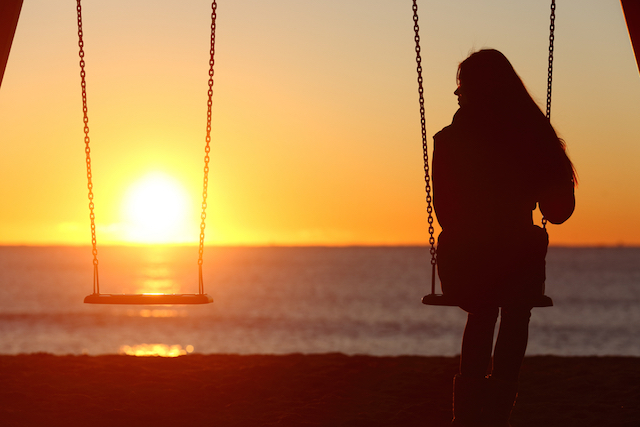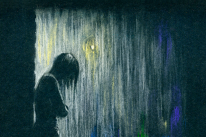
“We have all known the long loneliness and we have learned that the only solution is love and that love comes with community.” ~Dorothy Day
Throughout my life it’s been really hard to admit when I’ve felt lonely.
I’ve been through intense periods where I have been without others.
I’ve been surrounded by people yet have felt no real connections.
The people I have loved have been physically or emotionally absent.
I’ve simply been alone over weekends, over weeks, over months, over years, and it has been grueling and horrible.
I found I had to monitor how much I shared with friends and family about how terribly lonely I felt, and that many resisted hearing it.
I have been through periods when I’ve been successful and periods where my life has fallen into devastation; loneliness has been a part of both.
In our society to admit loneliness seems like a big admission of failure. It’s uncomfortable to hear. The subtext is that our loneliness is a result of our inability to make connections. It’s all our fault.
I don’t know about that. I think it’s time that we understood that we are not alone in our loneliness, and it has more to do with the society we live in than anything else.
Experts are now saying that loneliness is becoming an epidemic, particularly in western societies.
Governments are just starting to see loneliness as an issue that has serious repercussions on our health and well-being. It’s become obvious to the structures that govern and to those that study us that loneliness is an issue that needs to be addressed.
Where Did This Epidemic Come From?
The fact is that humans aren’t used to being so alone. We’ve had literally hundreds of thousands of years of programming for living in groups.
Groups were important in keeping us alive. Our children were reared by the group. Meal times were a group affair. Groups were crucial in protecting us from predators and finding food.
Groups played a part in helping us to advance as a species over our distant cousins, the chimpanzees. We were really good at hanging out, chewing the fat, having some intergroup fighting, and making up with group hugs.
About 250 years ago the industrial revolution changed all that. Machines replaced the things we could do by hand. Stuff could be produced in mass quantities, which meant that we didn’t need to go down to Mrs Grumblebutt’s cottage for butter, or Arg Arg Arg’s corner of the cave for mammoth meat.
Two hundred and fifty years is not long time if we consider that modern humans hung in groups for at least 100,000 years.
This short, sharp change started to cause the dissipation of communities, as we no longer needed to rely on each other but on the system to meet our needs. We could live further apart, raise the height of our fences, and function as independent but separated beings.
So there it is. It’s simple stuff, I know. We all know that it happened, but when we are crying in our houses we just need to remember that this has only just happened. Only just a little over 250 years ago things were different.
We changed because our mechanism for survival changed from groups to a system, so it’s asking a lot to expect that a species that has had thousands of years of genetic programming for group living should all of a sudden live separately.
Turning the Tide
I think we still need groups for survival, maybe not so much anymore for the food in our mouths, but for everything else—for a chat, for help with working through issues, for a shared direction, a shared passion, for a fight or two if that’s what’s needed, for care, and for hugs.
We don’t talk so much about pestilence or camels or carving sticks anymore, but there’s lots we need to discuss, such as how to fix a tap, climate change, cake recipes, sadness, music, politics—the list goes on.
The rise of online communities is evidence that we are programmed for group living, but we really do need face-to-face contact, as that’s what we are used to as a species, whether it be through hobbies, friendships, families, or building better societies. We need to revive our tribes!
So what’s stopping us from being part of a face-to-face group? One of the remedies for loneliness is within our grasp, so why aren’t we doing anything about it?
Part of it could have to do with the recent rise of the ridiculously busy movement that seems to have appeared in response to loneliness. It’s about filling one’s life up so there’s no time to feel alone, and it has a particular call and response mechanism.
“How are you?”
“I’m so super duper busy. How are you?”
“I’m ridiculously crazy over-the-top busy.”
Hmmmm. Being ridiculously busy is not a badge of honor but evidence of imbalance. It’s not surprising that our culture has invented it, as there’s such a big gap to fill, but it’s not the way forward.
It’s logical that ridiculously busy people get worn out and can feel even lonelier in the process.
If one is rushing around, there’s little time to forge deeper bonds and be there for others. It’s rewarding and stimulating in the short term, but self-defeating in the long run.
Many of you could argue that you are ridiculously busy as a result of society and its demands, but I would say that busyness is a choice, and we need to ask ourselves why we have made these choices.
Was it to fill some gaping hole? Is it necessarily your fault that the hole is there as per the discussion above?
When I think about my friends and family and their resistance to hearing about my feelings of loneliness, I realize there’s a very real possibility they felt this underlying loneliness too.
Maybe underneath all those layers of busyness there was a gaping hole, and hearing about someone else’s loneliness was too much of a trigger for theirs.
The problem with the ridiculously busy movement is that there’s no longer any time to hang out. All engagement must be scheduled. We don’t have time to ask of each other what we truly need. We don’t feel we have a right to do so.
So what’s the answer? How can we feel less lonely?
We need to reduce the amount of things we are doing, to see the formation of a group or groups as a priority, and to thank the system sincerely for supporting us but to make a firm commitment to working out how we can support each other. We need our tribes.
Alternatively, if we aren’t busy and feel terribly lonely, then we’ve got plenty of time to get on our sneakers and get out to find the tribes that we’ve lost. We need to honor our programming.
I know that there will be resistance and fear associated with making any of these moves, as we’ve put up a lot of gates between us over the last couple hundred years, but we’ve got to swallow this fear and go for it.
Feel comfort from the fact that it’s the path that almost everyone else in our bloodline walked, so we do have some good intuitive backing to help us.
Building Community with Self
As well as being fierce about re-establishing our tribes, there’s something else that might help with loneliness.
Most people in tribal communities had a role. They made shoes, rubbed goat dung on sick people, made swords and crossbows and feather dusters when they were feeling more peaceful.
I’ve found one of the absolute keys to feeling less lonely is to ask myself, “If I could be anything, what would I be in the village? How would I serve others?”
The beauty of asking this question is that we are actually asking who am I? We are getting to know ourselves.
If we tune in to what we really want, we are ultimately not going to have to ignore or run away from our deepest needs.
Obviously direction or purpose is just part of the puzzle of getting to know ourselves, but it’s a good place to start.
I’ve found that honoring my calling as a writer has been absolutely fundamental in feeling comfortable with myself, and I’m far more able to handle times of loneliness and rejoice in times of connection.
All this comes with the big caveat that society is, once again, not particularly encouraging of this type of thinking, and will do lots of things to put up barriers and fears to stop us from doing and being what we want. Society has created a structure, and there’s an incredible amount of pressure to conform to it.
That said, it’s worth it to be able to sit down with yourself and say, “I’m happy with you. Finally you are doing what I’ve been asking for all along.”
Let’s call this process self-talk, self-community, building a helpful dialogue in ourselves. The bottom line is that when we are happy with ourselves and are listening to our beautiful inner voice, we feel a lot less lonely.
Calling in the Tribe
So there it is. A little exploration into why we are lonely and what to do about it.
Feeling lonely is not your fault. Our society has thrown us a bit of a curveball and now it’s time to throw that ball right on back, spit on a wall, build a bonfire, and have a super huge hug with ourselves and someone lovely.
And right now, I’m also sending you that hug across the campfire, ‘cause that’s what tribe members do.
Lonely woman image via Shutterstock
About Kaylia Dunstan
Kaylia Dunstan is the creator of The Word Room, a place of freedom and fancy, healing and wholeness, and desire and dance. She loves expression liberated and beautiful being. Kaylia has been a commercial writer for many years. Meet up with Kaylia in The Word Room and on Facebook. There’s a cup of lemongrass tea waiting.
- Web |
- More Posts













 Though I run this site, it is not mine. It's ours. It's not about me. It's about us. Your stories and your wisdom are just as meaningful as mine.
Though I run this site, it is not mine. It's ours. It's not about me. It's about us. Your stories and your wisdom are just as meaningful as mine. 